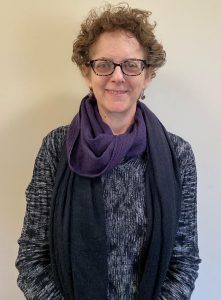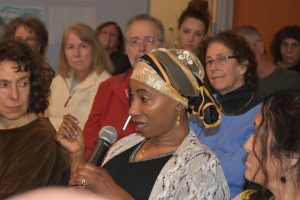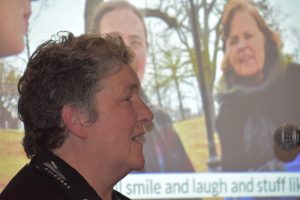Episode Description
This is our final episode for Season 1! In this episode, Mindy interviews Karen Wasserman, a national elder care expert, and the Director of Your Elder Care Experts. Karen responds to a series of important questions and comments listeners sent in through voice and email messages. These include: how to help a loved one in need who is resisting support; where to find community-based resources to help navigate the care system; the role of aging life care managers, where to find support for caregivers; and how to negotiate care with siblings.
Guest Bio:
Karen Wasserman, LICSW
 Director, Your Elder Experts
Director, Your Elder Experts
Karen Wasserman has worked with older adults and their families for the past 30 years. Her career path has paralleled the path that many older adults take, from the community to the hospital, to rehab and then back into the community with support and services. She has worked at the West Suburban Area Agency on Aging, as Director of Social Services at the former Mediplex of Newton, a local nursing and rehabilitation center, and at the Beth Israel-Deaconess Medical Center.
During her time at Beth Israel she counseled people preparing for and recovering from surgery, and worked with patients and their families who were confronting major life transitions.
Her expertise and insight into the complicated medical, emotional and logistical concerns around aging, and her steadfast advocacy for her clients is respected throughout the profession. Karen started Your Elder Experts, the Care Management program at JF&CS, in 1999 and has managed its growth into one of the Greater Boston Area’s leading Care Management practices.
She also leads educational programs and information sessions in the community about services for older adults, housing, and care management and other related topics. She is a Certified Care Manager (C-ASWCM) and is a member of NASW and both the national and New England chapters of ALCA (Aging Life Care Association).
What would you like to see in Season 2 of The Shape of Care? Please email me or leave a voicemail message with your ideas! I would love to hear them, as we’re now in the planning stages…
Now that we’ve released Episode 7, the final episode of our first season, I’m going to indulge in a little reflection about my father. What I haven’t told you is that this podcast is a tribute to him. The history of the podcast begins with my experience caring for him in the final chapter of his life. I know he would have been proud of me. Alas, he’s been gone for nearly ten years.

I decided to create The Shape of Care after touring with my memoir about caring for my dad: Caring for Red. To many people, he was one of those “larger-than-life” characters, persecuted for his political beliefs during the McCarthy Era, withstanding criticism from all sides. But he never backed away from his commitment to social justice. During my childhood, he was a runner when no one else was jogging publicly, wearing crappy sneakers or his wing-tipped shoes. (Real running shoes hadn’t been invented yet!) He was an avid reader, and consumed dozens of progressive newspapers and journals. He knew a TON about the world, and he wore people out in political debates. He was my biggest supporter and my role model, but he was also a terrible listener who, in the middle of a vigorous discussion, would interrupt me because he said he already knew what I was about to say. He once told me that if you don’t know something, guess, you’ll be right 99% of the time! That’s how certain he felt about his opinions! Infuriating!
 That said, whenever I struggled with anything – relationships, work stuff, you name it – he was the first one there, and his warmth and support was a constant. Over the years, I came to understand that my father struggled with depression, and when I, too, suffered from bouts of depression, he understood and was there for me.
That said, whenever I struggled with anything – relationships, work stuff, you name it – he was the first one there, and his warmth and support was a constant. Over the years, I came to understand that my father struggled with depression, and when I, too, suffered from bouts of depression, he understood and was there for me.
Caring for my father in the final year of his life was an honor. By the time we reached that point, I had done enough therapy that I was able to accept his annoying traits, to no longer feel any deep resentments… My goal in caring for him was to be the best daughter I could possibly be, to understand what he was going through and do whatever I could, along with my sister, to help him have the best life during this last segment of his life.
 As I think about what I’d like to do in Season 2 of The Shape of Care, I try to imagine what my father would say. First, he would tell me that I was doing a great job. When I was younger, I felt his unconditional support was a function of how much he loved me, not because what I was doing was so great. But as I get older, those words of support and encouragement are validating.
As I think about what I’d like to do in Season 2 of The Shape of Care, I try to imagine what my father would say. First, he would tell me that I was doing a great job. When I was younger, I felt his unconditional support was a function of how much he loved me, not because what I was doing was so great. But as I get older, those words of support and encouragement are validating.
As a storyteller who wrote plays and non-fiction, my father urged me to continue to tell people’s stories, to elevate the invisible experiences of people who struggle. In the case of caregiving, he would understand the broader picture – that in this country, we lack a set of comprehensive set of policies that support families at all stages of life. But he would also appreciate that the hard work of caregiving also involves people struggling with family dynamics, as well as facing death.
IF my father were still alive, he’d have strong opinions about what to cover in this next season. Maybe explore housing options for people as we age? Maybe focus more on the care workforce, looking at ways to address the potential shortage of care workers in the future? Maybe include interviews with some of my colleagues who are doing research on aging and long-term care? And perhaps a look at international models for long-term care that are working? I feel sad that I can’t have that conversation. But the truth is: I can still hear him. And now, he’s a better listener…
I welcome your ideas for Season Two of The Shape of Care. Our phone number is 617-600-8709 or email us here. Please be in touch!
Resources
AARP/Alzheimer’s Association Community Resource Finder:
AARP provides comprehensive coverage of issues affecting caregivers, including offering free guides, legal checklists, information on care options and an online community supporting all types of family caregivers. They also have a caregiver support line for one-on-one help.
Provides information, educational materials and support for family caregivers.
Since 2011, CAG has been building a movement of all ages and backgrounds to transform policy and practice around caregiving in this country. CAG develops innovative policies, which fuel their organizing campaigns.
The Diverse Elders Coalition (DEC) advocates for policies and programs that improve aging in our communities as racially and ethnically diverse people; American Indians and Alaska Natives; and lesbian, gay, bisexual and/or transgender people.
Elder Care Locator/Area Agencies on Aging:
A nationwide service that connects older Americans and their caregivers with local support resources. Links those who need assistance with state and local agencies on aging, as well as community-based organizations that serve older adults and their caregivers.
Provides services to family caregivers of adults with physical and cognitive impairments, including Parkinson’s Disease, stroke, Alzheimer’s and other types of dementia. Services include assessment, care planning and respite services.
National Alliance for Caregiving:
A coalition of national organizations focused on family caregiving issues. The coalition conducts research, does policy analysis, develops national best-practice programs, and works to increase public awareness of family caregiving issues.
A national organization that helps people aged 60+ meet the challenges of aging. NCOA partners with nonprofit organizations, government, and business to provide innovative community programs and services, online help, and advocacy.
National Council on Aging/Public Policy
National Domestic Workers Alliance
The nation’s leading voice for dignity and fairness for the millions of domestic workers in the U.S. Includes 60 affiliate organizations and local chapters and thousands of members. Domestic workers in all 50 states can join NDWA and access member benefits, connection with other workers, and opportunities join the domestic worker movement.
National PACE Association:
The National PACE Association (NPA) advances the efforts of Programs of All-Inclusive Care for the Elderly (PACE®). PACE programs coordinate and provide all needed preventive, primary, acute and long-term care services so older individuals can continue living in the community.
Wellspouse:
Provides support for spouses who are caregivers, including a national network of support groups and an online chat forum.